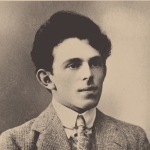Lord, Thou hast given me a cell
Wherein to dwell,
A little house, whose humble roof
Is weather-proof:
Under the spars of which I lie
Both soft, and dry;
Where Thou my chamber for to ward
Hast set a guard
Of harmless thoughts, to watch and keep
Me, while I sleep.
Low is my porch, as is my fate,
Both void of state;
And yet the threshold of my door
Is worn by th' poor,
Who thither come and freely get
Good words, or meat.
Like as my parlour, so my hall
And kitchen's small;
A little buttery, and therein
A little bin,
Which keeps my little loaf of bread
Unchipp'd, unflead;
Some brittle sticks of thorn or briar
Make me a fire,
Close by whose living coal I sit,
And glow like it.
Lord, I confess too, when I dine,
The pulse is Thine,
And all those other bits, that be
There plac'd by Thee;
The worts, the purslain, and the mess
Of water-cress,
Which of Thy kindness Thou hast sent;
And my content
Makes those, and my beloved beet,
To be more sweet.
'Tis Thou that crown'st my glittering hearth
With guiltless mirth;
And giv'st me wassail-bowls to drink,
Spic'd to the brink.
Lord, 'tis Thy plenty-dropping hand
That soils my land;
And giv'st me, for my bushel sown,
Twice ten for one;
Thou mak'st my teeming hen to lay
Her egg each day;
Besides my healthful ewes to bear
Me twins each year;
The while the conduits of my kine
Run cream, for wine.
All these, and better, Thou dost send
Me, to this end,
That I should render, for my part,
A thankful heart,
Which, fir'd with incense, I resign,
As wholly Thine;
But the acceptance, that must be,
My Christ, by Thee.



















Comment form: